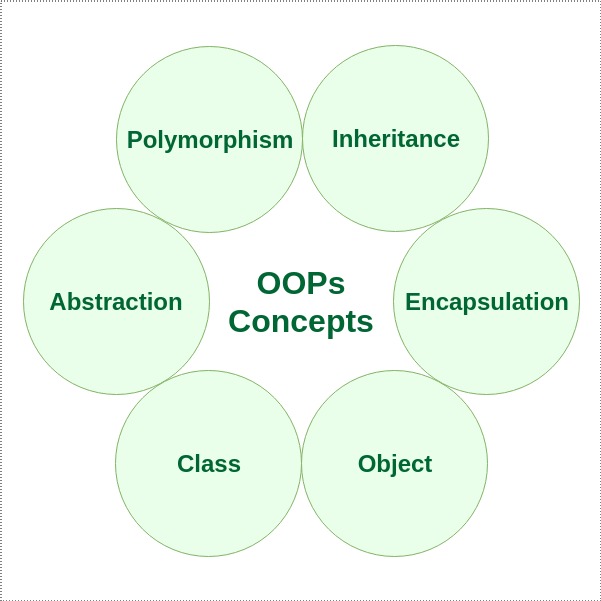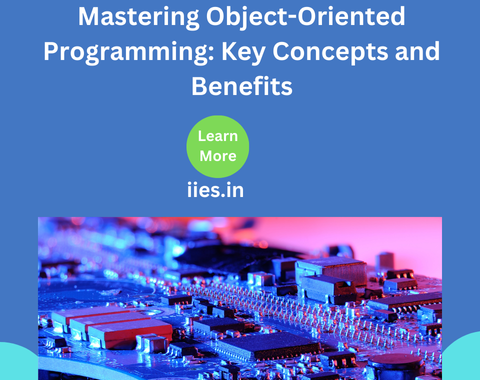Name impiles uses objects in programming.
Oop is aimed to implement real time entiites
- inheritance,
- hiding,
- polymorphism
The primary objective of OOP is to combine data and the functions that manipulate it into a single unit, ensuring that only the designated functions have access to this data, preventing other parts of the code from directly interacting with it.
- Class
- Object
- Encapsulation
- Abstraction
- Polymorphism
- Inheritance
- Dynamic Binding
- Message Passing
- Characteristics

Class:
The real world entity that has both data and functions are binded together.so that other functions will not access will not access data members of other function.
For example: let take a student class that has data members:
Data members:
Studentname:
StudentId:
StudentMarks:
Data functions:
Calculatetotal()
CalculateAverage()
CalculateAttedance()
For example: let take a vehicle class that has data members:
Data members:
VehicleNo:
ModelName:
Modelno:
ModelColor:
Data functions:
Start()
Stope()
ApplyBrake();
Object:
When a class is defined in C++, no memory is allocated. However, memory is allocated when the class is instantiated by creating an object.
Encapsulation:
Encapsulation is a process of binding the data and members together
Class is an example of class
Class Student
{
string studentname:
int studentid:
int studentmarks:
Calculatetotal()
CalculateAverage()
CalculateAttedance()
};
Abstraction:
Abstraction in C refers to the concept of hiding implementation details and exposing only the necessary functionality to the user.
While C does not directly support abstraction in the way object-oriented programming languages like C++ or Java do,
it can achieve abstraction through the use of functions, pointers, and structures.
#include <stdio.h>
// Abstracted function
int add(int a, int b) {
return a + b; // Implementation detail hidden
}
int main() {
int result = add(5, 3); // Focus on the “what” rather than “how”
printf(“Result: %d\n”, result);
return 0;
}
Polymorphism:
The word “polymorphism” means having many forms.
A Person who exhibits different behavior like employee, husband,father
One function is used in different purposes.
There are two types of polymorphism:
Compile time polymorphism
Runtime polymorphism:
Compile time polymorphism is a polymorphism that can be achieved by using
Changing the number of arguments:
Changing the number of arguments:
Void add(int a,int b)
Void add(int a,int b,int c)
Changing the type of arguments:
Void add(int a,int b)
Void add(Float a,float b)
Runtime polymorphism:
Runtime polymorphism occurs when the method to be executed is determined at runtime. This is achieved in C++ using inheritance and virtual functions.
#include <iostream>
using namespace std;
// Base class
class Animal {
public:
virtual void makeSound() { // Virtual function
cout << “Animal makes a sound” << endl;
}
};
// Derived class: Dog
class Dog : public Animal {
public:
void makeSound() override { // Override the base class method
cout << “Dog barks” << endl;
}
};
// Derived class: Cat
class Cat : public Animal {
public:
void makeSound() override { // Override the base class method
cout << “Cat meows” << endl;
}
};
int main() {
Animal* animalPtr; // Pointer to base class
Dog dog;
Cat cat;
animalPtr = &dog;
animalPtr->makeSound(); // Calls Dog’s makeSound at runtime
animalPtr = &cat;
animalPtr->makeSound(); // Calls Cat’s makeSound at runtime
return 0;
}
Inheritance:
Inheritence is used to acquire the properties and behavior of one class into another class
Code Reusability
Polymorphism
class BaseClass {
// Members of BaseClass
};
class DerivedClass : access_specifier BaseClass {
// Members of DerivedClass
};
Types of Inheritance in C++:
-
Single Inheritance
:
- A single base class is inherited by one derived class.
class Animal {
public:
void eat() { cout << “This animal eats food.” << endl; }
};
class Dog : public Animal {
public:
void bark() { cout << “Dog barks.” << endl; }
};
- A derived class inherits from more than one base class.
class Father {
public:
void traits() { cout << “Traits from Father.” << endl; }
};
class Mother {
public:
void care() { cout << “Care from Mother.” << endl; }
};
class Child : public Father, public Mother {};


